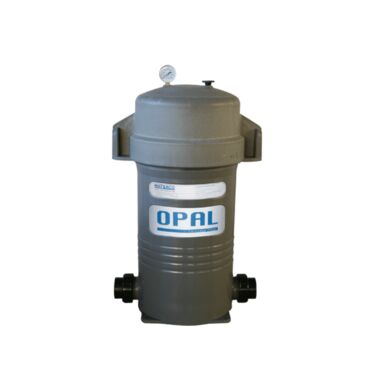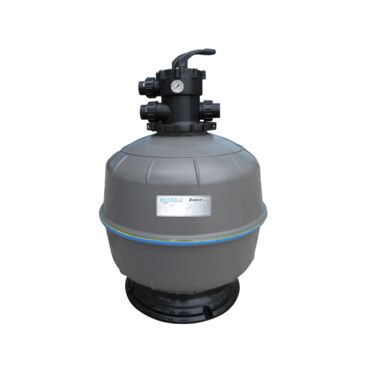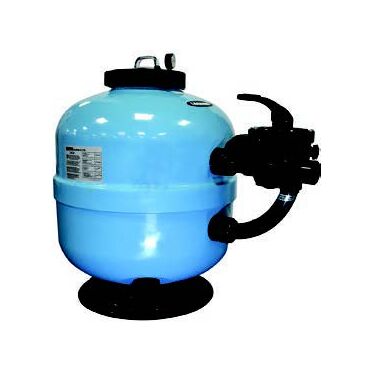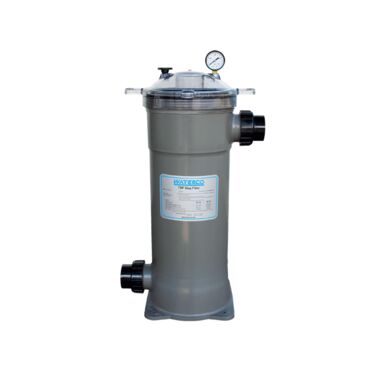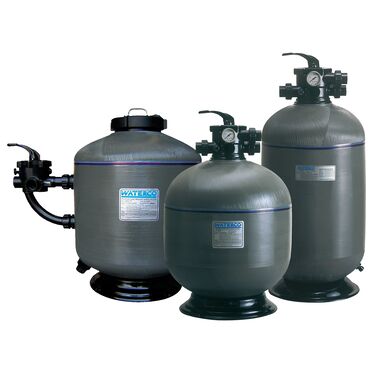General filters
Pool water free from debris and other contaminants is important for maintaining swimmers’ health and safety, not to mention happiness. But the type of filter you need can differ depending on your filtration needs, financial situation and willingness to put time and effort into maintenance. Plus the quality of filtration depends on the size of the filter media; the finer the media, the higher the purity of water achieved.
Here’s some information on the most common types of pool filters on the EU market to help you decide which type is best suited to you.
Sand/Media
How it works:
Manufactured with high grade fibreglass and resins for durability, this filter will give you years of clean pool water. Depending on the choice of media, this medium filters out everything larger than 3 - 40 microns. Sand/media still remains the most popular choice on the market for their durability and simplicity in maintenance
Pros:
Manufactured with high grade fibreglass and resins for durability, this filter will give you years of clean pool water. Depending on the choice of media, this medium filters out everything larger than 3 - 40 microns. Sand/media still remains the most popular choice on the market for their durability and simplicity in maintenance
Pros:
- Durable and easy to clean, as it does not need to be disassembled like other types of filters
- Filter’s multiport valve to give you control of water flow through the filtration circuit
Cons:
- Filter media needs to be replaced approximately every five years
- Needs to be backwashed regularly, which can use a lot of water
- Generally requires a larger installation space compared to other filter choices
Cartridge
How it works:
Cartridge filters typically use four cylindrical accordion pleated filters to trap anything larger than 30 microns, traditionally making them a higher filtration level than sand filters. However, this option can come with some extra costs and maintenance.
Pros:
Cartridge filters typically use four cylindrical accordion pleated filters to trap anything larger than 30 microns, traditionally making them a higher filtration level than sand filters. However, this option can come with some extra costs and maintenance.
Pros:
- No need for backwashing, no backwash line is required
- Generally requires less space for installation
- As no backwashing is required, requires less water for maintenance, more environmentally friendly than other kinds of filters
Cons:
- Unlike other filters, there’s no provision for backwashing; when the cartridge is clogged, it must be removed for cleaning
- Needs to be disassembled and cleaned
- Cartridges may need to be replaced more regularly than filter media, depending on level of use and care
Glass Pearls
How it works:
One of the newest filter media on the market, Glass Pearls offer a filtration level comparable to DE. Made from pure glass, the Glass Pearls filter out anything larger than 3 microns, giving you superior quality water.
Pros:
Small effective size of only 0.6mm to 0.8mm. Its narrow particle size range allows very effective in-depth filtration
One of the newest filter media on the market, Glass Pearls offer a filtration level comparable to DE. Made from pure glass, the Glass Pearls filter out anything larger than 3 microns, giving you superior quality water.
Pros:
Small effective size of only 0.6mm to 0.8mm. Its narrow particle size range allows very effective in-depth filtration
- Spherical shape of beads means less friction levels inside the filter and therefore requiring only 20% of the water you would use to backwash a sand filter
- Chemically inert, safe, smooth and high purity
Cons:
- Still requires backwashing occasionally
- More costly than sand and Zeoplus
